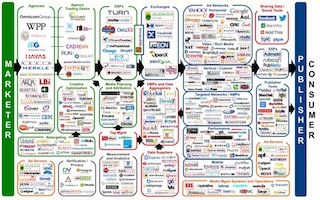This article is more than 1 year old
We’re not holding biz to ransom, says pay to play ad-blocking outfit
No, really. We’re here to help
Far from killing the advertising industry, ad blockers are saving it from itself, says the company behind AdBlock Plus.
Eyeo was responding to headline-grabbing remarks by Culture Minister John Whittingdale earlier this week.
Whittingdale didn’t name names, but compared ad blocking software companies who whitelist advertisers for a fee to a “protection racket”. This is the business model adopted by Eyeo. The German outfit commercialises the AdBlock software and employs over 50 people.
Ad blocking is an expression of consumer power, the firm pointed out.
“Without ad blockers and other tools end-users would have precisely zero power over their experience on the web, online security threats (in ads these are called 'malvertising' – and they are vicious) or their own privacy,” the company said in an emailed response. It added:
Ad blocking software empowers users to have a better online experience and also opens the doors for greater innovation amongst publishers and advertisers, creating more unique forms of monetisation for better-funded journalism, and ultimately bettering the industry.
Eyeo also promised to engage in discussions with ad-slingers to “better the consumer’s online experience.”
Not reported so much was Whittingdale’s acknowledgement that mobile ads make the user experience suffer, and only the ad industry could address this. In that, he’s probably correct.
The fraud-friendly cesspit that the advertising industry has created is best illustrated by this diagram of the digital advertising market. Savour its simplicity and elegance...
Eyeo statement
In a recent speech at the Oxford Media Convention, the Culture Secretary, John Whittingdale, outlined his views on the rise of ad blocking technologies and the impact on the newspaper and music industries. While we might not share all the same beliefs seen in the statement, one thing we are in complete agreement with is the need for cooperation in order to resolve the challenges within advertising – not just between advertisers, publishers and ad blockers but also consumers as well.
Ad blocking is a consumer reaction expressing unambiguous disapproval of online advertising, which grew from a hobby project in 2006 to the phenomenon it is today. As ads have become more intrusive, increasing amounts of consumers have opted in to ad blocking. A testament to this can be seen from figures by the IAB and YouGov, which show that usage of ad blockers amongst British adults has risen from 18 per cent to 22 per cent since October 2015, and we only expect this figure to rise further.
Without ad blockers and other tools end-users would have precisely zero power over their experience on the web, online security threats (in ads these are called “malvertising” – and they are vicious) or their own privacy.
Beyond being essential for user control, ad blockers are paving the way to better ad formats. When even the Interactive Advertising Bureau, the industry’s leading lobbyist, admit that they have “messed up,” it’s clear that the industry needs to improve. So while it empowers consumers daily, ad blocking is also making greater strides to driving a better advertising industry. We were the first ad blocker to allow advertisements through if they meet specific standards designed to better the consumer's online experience; now others have implemented the idea.
This idea is far from perfect – indeed, in an effort to improve it, we will soon hand over control to an independent board – but it is moving in the pro-user direction of compromise. Ad blocking software empowers users to have a better online experience and also opens the doors for greater innovation amongst publishers and advertisers, creating more unique forms of monetisation for better-funded journalism, and ultimately bettering the industry. In order to achieve this we agree that communication is key and would be happy to engage in any discussions as to how we can continue to better the consumer’s online experience.
See our malvertising special feature for further horrors lurking in the food chain. ®

